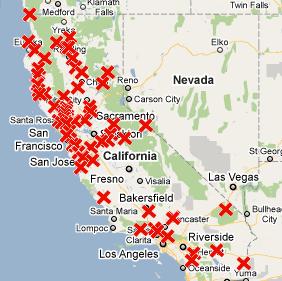Once again California is threatening to close state parks. Seventy (out of 270) parks are on the chopping block this time around (see an interactive map of the planned closures). The plan is to place the parks in “caretaker status,” which means gates would be closed and people would not be allowed to enter.

There are a few ideas being tossed around to keep parks open but they lack luster. There was Proposition 21, the regressive car tax that was rejected by voters last year. Now there is Senate Bill 356, which would require the state to give counties and cities a chance to take over operations of closed state parks in their areas. And there are plenty of statements such as those by State Assemblyman Jared Huffman (D-San Rafael) who said that park closures were inevitable, but that he would work to allow nonprofits to take over park operations in appropriate situations.
Why is this outcome inevitable and why only consider nonprofits? As Harris Kenny recently wrote in the Orange County Register:
There are private companies out there that will see California’s parks wasting away and envision a way to bring them back to life. Some facilities, like Tecopa Hot Springs County Park in Death Valley, operate under whole-park concession agreements, a remnant of California’s once-innovative past where the state leased some parks to private companies….Under these lease agreements, recreation companies manage and maintain the parks. The government can set any quality and maintenance standards it desires and hold the private company accountable to them with a performance-based contract.
Other states are already moving to protect their parks through lease agreements. Last year, Arizona asked private companies to present creative proposals on how they would enhance operations at state parks. The state is currently reviewing ideas submitted by six companies.
One of these companies is Recreation Resource Management, which offered to lease six Arizona state parks targeted for closure amid budget cuts. The company proposed to collect the same visitor fees the state charges today, while taking the operations and maintenance costs of these parks off the state’s books. Moreover, the concessionaire would pay the state an annual lease payment based on a percentage of the fees collected. The state would retain full ownership of the land, and the company would be subject to strict state controls on operations, visitor fees, and maintenance. As Leonard Gilroy wrote in PERC Reports last year, “the private sector is offering to take over the operations and management of cash-strapped Arizona state parks, keeping them open at no cost to the state.”
When the federal government threatened to close the gates to the Presidio due to budget constraints in the mid-1990s, Californians didn’t just stand by and let it happen. People got creative and pushed for the Presidio Trust. This innovative idea included separating the management of the Presidio from politics, with the goal of self-sufficiency providing an incentive to earn revenue. The revenue earned, primarily by leasing properties, then goes toward operating the park, preserving its natural and cultural resources, and ensuring its long-term care.
The Presido Trust arrangement has not been without road bumps, but the point is the Presido is still open and is one of the most stunning urban parks in the nation. Rather than simply closing parks, bureaucrats in Sacramento should step aside and let creative entrepreneurs and private companies do what they do best—produce products (e.g. parks) that people want.


